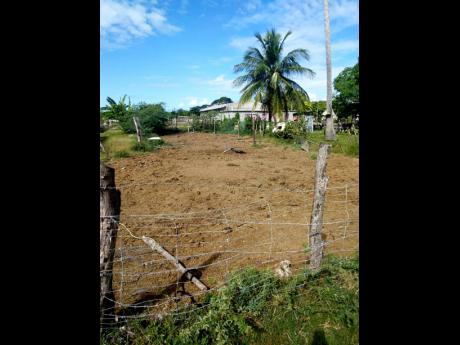Cow thieves thwart couple’s plans for better life
It has been days of tears for one Lionel Town, Clarendon, farmer since thieves made off with his herd of 30 cows more than a week ago.
Shawn Edwards, who developed a love for farming after his grandfather gifted him some cows as a child, told The Gleaner that he has become despondent since he went to retrieve the animals sometime after 3 p.m., two Sundays ago, from the area they grazed daily and was left in a tailspin after realising they had “vanished”.
Days of searching for the missing animals have turned up no clues.
“A just bare tears. A bare tears. Mi haffi cry every morning. As mi open the front door, it’s inna the pen mi a look,” an emotional Edwards told The Gleaner.
“Seven years now me start with two cows and me nuh try fi sell any. Mi just burn coal and buy them and a it mi live off. Mi nuh have no education fi do no big work,” the 45-year-old farmer said.
Edwards said that on the day the animals disappeared, he had been contemplating going for them from as early as 10 a.m.
“But maybe if mi did go, mi would a dead. Maybe them would a shoot me, but mi have life so mi a say mi can build again,” he said.
Edwards’ wife, Sabrina, who is also heartbroken over the incident, described him as a hard worker.
“It hard fi know he works so hard and he’s an honest man and dem come and take his stuff. The Government said farming is the future and we must grow what we eat, but how can you raise your animals in a country like this when you can’t raise them in peace? You work hard then a man come and take them from you,” she bemoaned, adding that in recent times, crooks have been plaguing farms in the area and the neighbouring Mitchell Town.
The couple said that the theft has thwarted their plans for a better life.
“We were trying to build a house ... . We don’t have anything and he was planning to use [money earned from] his cows to finish the house. We don’t have a bathroom, we don’t have a kitchen. We don’t have anything, and that’s why him cry because them tek everything from him,” Sabrina said.
A friend of the couple, Rushawn Morris, who is also from Lionel Town, said that five of his own cows were snatched in December.
Morris, who owns a pig farm, said that he had just ventured into cow rearing when the thieves struck.
“I was at work and the cows were in the pasture and dem just come and take all of them,” said Morris, who plans to ramp up security on his farm before investing in more animals.
Jamaican farmers are estimated to lose upwards of $7 billion annually due to praedial larceny.
Wayne Reid, parish agricultural manager of the Rural Agricultural Development Authority (RADA), said he was not aware of Edwards and Morris’ cases, but said that farm theft continues to be a major pain in Clarendon.
He noted that many farmers are contemplating exiting the sector as a result of the problem and expressed concern that this could cause major setbacks to the agricultural sector as the country could become more dependent on imports.
“The thieves now are getting the better of a number of the farmers, and it’s affecting production,” Reid said, calling for harsher penalties for those found guilty of praedial larceny.
“The [police’s] Praedial Larceny Unit maybe needs some more manpower and resources. Some of the farmers have complained that some police stations or some officers are not taking the thing as seriously as [they should], and some persons are caught and taken before the court they get a little slap on the wrist, which is not serious enough to deter them,” Reid said.
Inspector Tedroy Clarke, who heads the Praedial Larceny Unit in the parish, however, said that his team is working assiduously to collar the crooks and deter potential criminals.
He appealed to farmers to practise tagging their animals to facilitate an easier return process in cases of recovery.
“There have been cases where we recover animals and farmers are not able to identify their cattle, and there are instances where we have to bring the animals to RADA or to a storage site in northern Clarendon,” he said, adding that the police have boosted patrols and response to help farmers secure their livelihoods.

